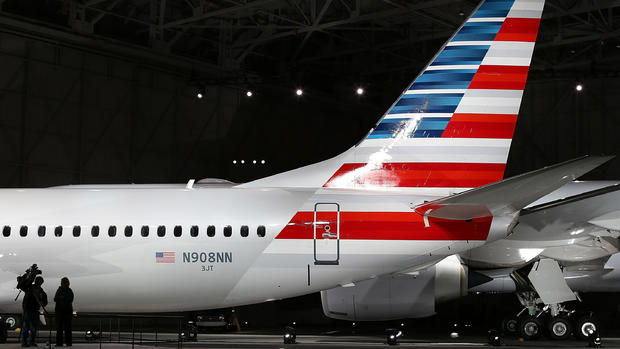Will American-US Airways merger push up fares?
(MoneyWatch) The merger of American Airlines (AAMRQ) and US Airways (LCC) will help the companies more than it would their customers.
Late yesterday the boards of the two companies agreed to the merger which would create the world's largest airline. The agreement still needs to be approved by federal regulators but that is not expected to be a major hurdle.
The new company will operate as American Airlines and will have the resources needed to keep up with its rival U.S. carriers. For the last several years United Continental (UAL), Delta Air Lines (DAL) and Southwest Airlines (LUV) have been upgrading service and expanding routes. Based on 2012 figures, the new American Airlines would have revenues of $38.69 billion, ahead of United Continental which had $37.15 billion in revenues last year. The new company would be 2.3 percent larger than United by capacity, and 2.2 percent larger by traffic.
- American Airlines, US Airways merging, if regulators approve
- Pilots grounding American Airlines without strike
- U.S. recovery fueled by record low natural gas prices
The combined company is expected to generate more revenues and cost savings by economies of scale in combined back-office and operational functions, combining headquarters, reducing the number of managers, sharing airport space and getting rid of some aircraft.
Although the merger will reduce the number of carriers in the U.S., airfares are unlikely to increase significantly. "While it would be unwise to assume prices won't go up, they probably won't go up by much," says Seth Kaplan, editor of Airline Weekly.
Kaplan says this is because US Airways and American don't overlap much in the routes they fly, so the company won't have a monopoly on any routes. That is why regulators rejected an attempt by US Airways to merge with Delta just a few years ago. With discount carries handling about 37 percent of domestic passenger air trips, the removal of one company is unlikely to ease competition.
For consumers the best thing about the merger is likely to be an end to the turmoil of a few years ago and better flight services, says Kaplan.
"We've gone from the a high competition and high turmoil situation of just a few years ago, when consumers didn't know if the airline they bought tickets for would still be operating when it came time to fly," he says. "Now all the major airlines are profitable -- although not hugely -- and can now invest in their product." This can mean better seats, more entertainment options and inflight WiFi.
In the short term, though, the merger could result in more lost luggage, flight delays and reservation problems while the two companies work to merge their systems. The Department of Transportation reported sharp increases in complaints about the issues following the mergers of US Airways and America West, United and Continental, and Delta and Northwest.
This merger marks the end of a period of consolidation that has steadied the U.S. airline industry by reducing the number of seats available to passengers and giving carriers more freedom to raise fares when needed. Despite this domestic fares today are 16 percent lower than they were in 2000 on an inflation-adjusted basis.
The deal comes a little more than 14 months after the parent of American Airlines filed for bankruptcy in November 2011. The all-stock merger is expected to give AMR creditors 72 percent of the ownership in the new company and US Airways shareholders the rest.
American Airline's unions are wholeheartedly behind the deal because of how unhappy they are with the company's management. Last April unions for pilots, flight attendants and mechanics all publicly endorsed the merger with US Airways. This was done to show their anger with executives who had used the company's bankruptcy to unilaterally change contracts. Last October the pilots staged a sick-out which caused American to cancel hundreds of flights.

